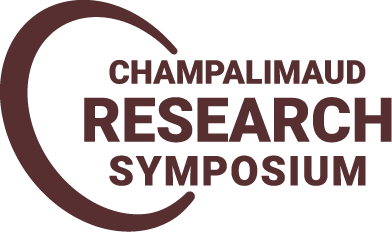
14 ︎︎︎ 16 · 10 · 2026
Lisbon, Portugal
CRSy26 will gather a diverse community of researchers to explore the interplay between the neural and immune systems in relation to cancer initiation, progression defense and therapy. This year’s edition will emphasize the dynamic interactions among tumor cells, neurons and immune components, and how these relationships impact tumour growth, metastasis and the tumour microenvironment.
Key topics will include mechanistic insights into neuro-immune signaling pathways, the influence of stress and innervation on tumor immunity and how neural activity can affect immune responses within tumors. The symposium will also feature cutting-edge tools and techniques such as spatial multi-omics, advanced imaging, circuit tracing and computational modeling that are transforming our understanding of these complex systems. By promoting cross-disciplinary dialogue, CRSy26 aims to spark new ideas and collaborations merging cancer neuroscience with immuno-oncology.
Key topics will include mechanistic insights into neuro-immune signaling pathways, the influence of stress and innervation on tumor immunity and how neural activity can affect immune responses within tumors. The symposium will also feature cutting-edge tools and techniques such as spatial multi-omics, advanced imaging, circuit tracing and computational modeling that are transforming our understanding of these complex systems. By promoting cross-disciplinary dialogue, CRSy26 aims to spark new ideas and collaborations merging cancer neuroscience with immuno-oncology.
Over three days, this symposium will provide a platform for basic researchers, clinicians and innovators to discuss how integrating neural and immune perspectives can lead to novel therapeutic strategies and a comprehensive understanding of cancer as a whole-body systemic disease.
CRSy26 will feature four keynote speakers, distinguished invited speakers and selected presentations from submitted abstracts. Attendees will also be able to showcase their research during two poster sessions, alongside networking and social activities.
Over 250 participants are expected for this engaging event, hosted in a venue known for its singularity and inspiring atmosphere. We trust this setting will encourage lively discussions and foster innovative scientific exchange. Don’t miss this opportunity to connect and collaborate with fellow researchers.
We look forward to welcoming you to Lisbon.
The Symposium Chairs,
Carlos Minutti
Henrique Veiga-Fernandes
Over 250 participants are expected for this engaging event, hosted in a venue known for its singularity and inspiring atmosphere. We trust this setting will encourage lively discussions and foster innovative scientific exchange. Don’t miss this opportunity to connect and collaborate with fellow researchers.
We look forward to welcoming you to Lisbon.
The Symposium Chairs,
Carlos Minutti
Henrique Veiga-Fernandes

![Carlos Minutti [Champalimaud Foundation]](https://freight.cargo.site/t/original/i/89f8cbf2422869c50fa385052791c4b3b4d07e7e287fde1555b807db80a55e9f/Carlos-Minutti-large-edited.png)
![Henrique Veiga-Fernandes [Champalimaud Foundation]](https://freight.cargo.site/t/original/i/c04af08d92800446fdd0cc10eb4d1813ce84844d30fb0ef064561a42b62592c9/Henrique-Veiga-Fernandes-edited.png)
![Douglas Hanahan [Ludwig Institute for Cancer Research]](https://freight.cargo.site/t/original/i/1a610b25947cd82f9ec6df569481606e8452ae4340c9ba852674f22d6b6fe1c8/DH-2971.png)
![Erica Sloan [Monash University]](https://freight.cargo.site/t/original/i/0dca3dc79b1d09edb18031d3aead891cdbeb6bb54ff18869a5464d25940e9115/ERICA.png)
![Florent Ginhoux [Gustave Roussy]](https://freight.cargo.site/t/original/i/36f9ea4b4e98b47a4faa8c320ff99256f30588a26d94e7d0e3b6320135b4c71c/Ginhoux-GR-edited.png)
![Susan Kaech [Allen Institute]](https://freight.cargo.site/t/original/i/8324665d46b364c8e2c0764d71745a757de3acd48a48d08a57bd8a692ed403f6/Sue-Kaech-scaled-edited.png)
![Adriana Sánchez-Danés [Champalimaud Foundation]](https://freight.cargo.site/t/original/i/b3902517471544375d3a62e3bea8e587b31459490037b8e1170fbdaf717018cd/Adriana-Sanches-Danes.png)
![Bing Zhang [Westlake University]](https://freight.cargo.site/t/original/i/7acb2506f743991ec191706f8b7baa2adb49073234c49b073432e76abcda6de6/bing2.png)
![Danyang He [Westlake University]](https://freight.cargo.site/t/original/i/2e58b4774538f7357a125fa64418b191b73a9385fcea12a1f5b8d9d221794d06/danyang-edited.png)
![Emmanuelle Passegué [Columbia University Irving Medical Center]](https://freight.cargo.site/t/original/i/1b068d88cd7e359eea01cd5480ee460e60da26f3c9c8a54e68cad127d735963c/EP-headshot-2025.png)
![Gabriel D. Victora [Rockefeller University]](https://freight.cargo.site/t/original/i/b6a04ad3ef14915ff448ed4df76006ea6180d95afbb2fc9acf27dae0182e93c8/victora-gabriel-d400x400-edited.png)
![Hector Huerga Encabo [CaixaResearch Institute]](https://freight.cargo.site/t/original/i/895fc9867e2f0903a9381f14eb9b01d9b39335ebbd08b5a8f60558711f92f265/Crick2025-edited.png)
![Ivan de Araujo [Max Planck Institute]](https://freight.cargo.site/t/original/i/773e82f2ab1ed43fdd3a00bcf2e4cb381205fde54fb01a7bfe749b1b9d0b44fc/ivan-edited.png)
![Karen Dixon [University of Basel]](https://freight.cargo.site/t/original/i/a4c0c8debcaefb107e2efc44e15cfb27aecaa28b9396198e66907373fd93f30c/karen-dixon-edited.png)
![Lai Guan Ng [Westlake University]](https://freight.cargo.site/t/original/i/610a4f9953b44be9b2d696d77f73b47a38f46a54469024fee01b47ab3de3e111/lai-guan-ng-edited.png)
![Mikäel Pittet [University of Geneva — UNIGE)]](https://freight.cargo.site/t/original/i/35d9e04fba16755fee6e7981ccf494f6aea204b37290f4a4da46e024ee8ac8ce/Mikael-EDITED.png)
![Ruaidhrí Jackson [Harvard Medical School]](https://freight.cargo.site/t/original/i/779c965e85cf5eb82e5ee34a34b45638c56c1c066a7545e37e377cfde230f991/jackson_ruaidhri-edited.png)
